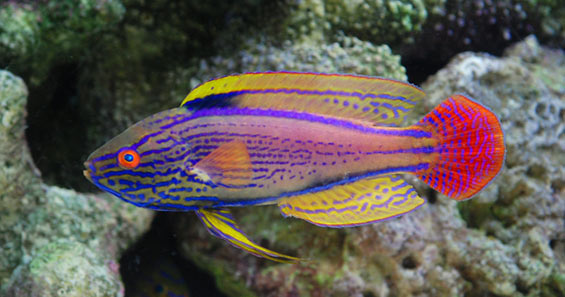Never had a FOWLR (fish only with live rock) so just a guess... for reef tanks I always promote weekly water changes 15-20%
but here a good read from a pretty good source for fish and they replace fish that die with a 30 day guarantee so you would think they would recommend frequent ones...
See what others advise... for fowlr stocking levels and the type of fish you select & how much you feed and how messy they are ... will certainly play a part... that say, as you stated above... you might can go with this recommend below... as a start and go from there... if this help you get back in the game ! Best of Luck !
monthly 25% water change is recommended
http://www.liveaquaria.com/PIC/article.cfm?aid=181
Importance of Water Changes in Aquariums
Water quality determines the continued health and growth of aquarium inhabitants. Aquarium water quality is not merely an aesthetic concern but a fundamental part of fish health management. Simply put, maintaining clean, healthy water through routine water changes is the key to the well-being of aquarium inhabitants.
WHY CHANGE WATER - DOES IT MATTER?
Routine water changes have always been a basic aspect of aquarium maintenance. However, with the development of efficient
filtration systems and versatile
chemical filter media, the emphasis once placed on routine water changes has waned. Further encouraging lax practices is the prevailing perception of water changes being laborious and time-consuming. Aquarium filtration helps extend water quality and slows down the buildup of harmful chemicals. However, filtration alone is not capable of completely offsetting the effects of declining water quality.
MAINTAIN BALANCE THROUGH WATER CHANGES
The basic dynamic that affects water quality is the on-going cycle of chemical import (addition) and export (removal). Whether through
feeding,
supplementation, or natural metabolic processes, various chemicals are constantly being introduced into the aquarium. While certain chemicals are imported into the water column, others are biologically processed or expported through filtration. When the import and export of these chemicals reach a state of equilibrium, the aquarium system is balanced and tends to have good water quality.
However, aquariums are closed systems where concentrations of imported chemicals and nutrients steadily accumulate over time. It is not uncommon for the import of chemicals to exceed an aquarium's ability to export them. When the aquarium system is not in balance, many undesirable aquarium conditions due to poor water quality begin to manifest. To prevent the effects of declining water quality, the hobbyist should intervene by performing regular water changes.
DISTINCT BENEFITS OF WATER CHANGES
Water changes restore and maintain a balanced aquarium by physically removing and diluting harmful chemicals as well as replenishing vital elements. Whether you have a fresh or saltwater aquarium, it is good practice to perform routine water changes. Key water change benefits include:
- REDUCTION OF NITROGENOUS POLLUTANTS Ammonia, nitrite, and nitrate are nitrogen compounds harmful to fish. Biological filtration process ammonia, converting it to nitrite, and finally into nitrate. Most aquarium systems lack the ideal conditions to efficiently process nitrate. As a result, nitrate accumulation is extremely common in both freshwater and marine aquariums. While fish are more tolerant of nitrate, high nitrate levels place chronic stress on them. As a result, fish become more susceptible to disease and demonstrate poor growth and color development. For sensitive corals and invertebrates, even low levels of nitrate can compromise proper growth and health.
- REMOVAL OF DECOMPOSING ORGANIC WASTE MATERIALS The routine removal of decaying organics during water changes is important in many ways. As organic waste breaks down, they release nitrogenous products, phosphate, and other chemicals that can lead to poor water quality. In extreme cases, decomposing organic materials create an acidic environment that can compromise the buffering capacity of water and harmful pH change can occur. Maintaining high, stable pH is especially important for saltwater aquariums.
- IMPROVED WATER CLARITY Routine water changes help remove discoloration and odors from aquarium water. In addition to the aesthetic benefit, clear water plays a vital role in reef aquariums. Light intensity required for proper growth of photosynthetic corals and invertebrates is diminished by turbid water. Routine water changes help maintain clear clean water for optimal light penetration and healthy coral growth.
- REPLENISHMENT OF TRACE ELEMENTS AND ESSENTIAL MINERALS In the ocean, there is a constant source of vital minerals, nutrients, and vitamins. However, in marine aquariums, trace elements and essential minerals are often removed through filtration or are depleted as corals and invertebrates use them to grow. Water changes provide a fresh supply necessary for proper growth, biological function, and coloration. Regular water changes also help maintain proper salt concentration.
Question:
How often should I perform a water change?
Answer:
As a general guideline, a monthly 25% water change is recommended. However, smaller, more frequent water changes (15-20% every 1-2 weeks) are preferable for heavily stocked aquariums or aquariums with large fish.



